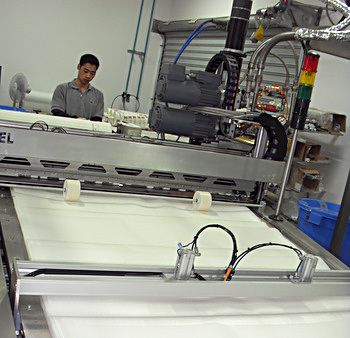
FOR MOST companies, individual orders and contract signings would not ordinarily be headline material.
But for Sinomem Technology Ltd (SGX: SINO), a Singapore-based membrane producer for a wide range of applications, each order is worthy of mention, not only for the size of each contract, but also for the rapidly growing number of signings.
Six Greater China fund managers attending a recent trip organized by Aries Consulting and Financial PR to six listed firms in Fujian province were given an eye-opening tour by Sinomem management.
A major impetus driving Sinomem’s growth has been the strong showing by its wholly-owned China-based unit, Suntar Xiamen, which Sinomem calls its “core subsidiary.”
The Fujian province-based firm in the southeast of the country was established in 1996 along with its parent to provide integrated processes and engineering solutions for separation, purification and cleaner production practices in diverse industries via advanced membrane technology.
Suntar is based in the port city of Xiamen, a city that on a clear day is within naked-eye sight of outlying Taiwan islands, and is also a short commute of literally hundreds of sprawling factories, many of them funded by Taiwanese investment and all of them worried about how to meet increasingly stringent environmental wastewater treatment standards.
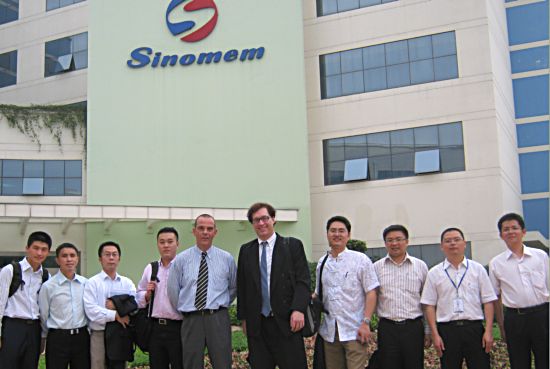
Suntar: PRC’s top industrial membrane brand
The accomplishments of Sinomem’s core subsidiary are exemplary.
“We are striving to be a global leader in the development of advanced membrane technology for water purification, wastewater treatment and cleaner production,” Mr. Lan Chunguang, Vice President of Sinomem Technology Ltd and General Manager of the membrane technology division of the group, told our group of visiting fund managers.
Suntar has locked up an over 50% market share for membrane applications in China’s pharmaceutical sector, and an unbeatable 90%+ share of the membrane market serving the country’s massive dyestuff industry.
|
|||||||||||||
It is also the leading company in China supplying membrane separation technology for fermentation broth, and the top provider of membranes for Nanofiltration (NF).
Getting more technical, the company is the leading provider of membrane technology for China’s industries applying UF, NF, continuous IX and chromatography technologies into production of Vitamin C, penicillin and 7-ACA production.
Its dyestuff desalinating technology membranes were responsible for rewriting China’s national industry standards, and as the top designer and developer of UF and fermentation processing separation technologies, the company has collected numerous awards and has several national patents under its belt.
Finally, due to its market-leading R&D work into membrane cleaning technology, Suntar has contributed 20 different special cleaning agents into the market, all currently used in industrial applications.
Practical applications of its myriad technologies are expansive.
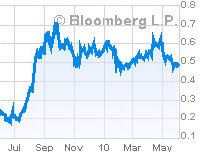
Nearly 500 sets of its patented Flow-Cel UF systems with a total membrane area of up to tens of thousands of square meters have been sold and installed so far, with over 100,000 tons daily handling capacity.
In 2007, Suntar upgraded the Flow-Cel system, increasing the effective membrane area by 43% under constant hydraulic conditions, which substantially reduces the client’s investment cost.
“Requirements for wastewater and drinking water are getting more and more strict in China. Therefore, water pollution control will remain our main emphasis going forward, and membranes for water treatment are the most promising business growth area for us right now, and we currently give it top priority,” Mr. Lan said.
Also, its Nanofiltration (NF) membrane systems, highly suitable for the dyestuff industries as well as desalination applications, have provided over 200 clients at home and abroad with more than 400 spiral wound NF membrane units with total membrane area of 200,000 square meters.
Its ceramic membrane technology, as opposed to its polymer membranes, are increasingly being used by China’s big brand milk, juice, spirits, beer and even soy sauce and vinegar distillers.
Suntar’s ceramic membranes consist of symmetric porous material made from alumina, zirconia or titania, and offer pore sizes far, far too small to discern with the naked eye (0.01-10 microns).
Most Mainland Chinese opening their refrigerators right now would be hard pressed to not find a product inside that at one point may have passed through a Suntar membrane – porcelain or otherwise.
Suntar to the Rescue
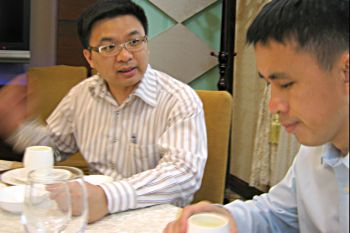
Fujian is not only one of China’s most prosperous provinces, but also one of its fastest growing.
This growth covers both the GDP and the overall population.
So with a still vibrant economy and more people migrating into the province to hitch a ride on the growth, Suntar not only has more potential clients in factories looking to clean up their emissions, but also those entities looking to provide more clean drinking and household use water to the expanding urban populations.
But one of the most notable aspects to Suntar’s business, especially in China, is that it is not just ensuring clean water coming into our homes and cleaner wastewater reentering the water table that is driving growth for the business.
Its membrane process applications are seemingly endless, having already significantly expanded into the beverage, pharmaceutical, nutriceutical and rosin chemicals sectors.
A quick glance at Sinomem’s company profile -- and significant unit Suntar -- is rather difficult because operations so expansive can hardly be absorbed in a quick once-over.
But summarizing wherever possible, here is the company’s scope of operations:
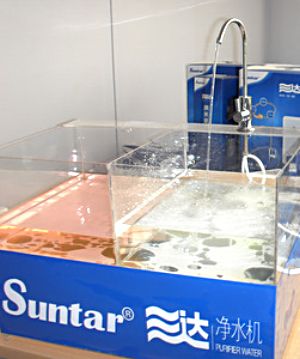
The group, which also includes wholly-owned Singapore-listed subsidiaries Reyphon Agriceutical Ltd (SGX: CZ3) and Pharmesis International Ltd (SGX: PHM), is engaged in the manufacture of polymer membranes, membrane-based processes and development, engineering designs, equipment fabrication, system integration, on-site installation and commissioning, and after-sales technical support services.
In addition, it provides wastewater treatment services to municipal and industrial users usually under build-operate-transfer (BOT) arrangements, and engages in the trade of stainless steel and glucose products.
It also produces and sells gibberellin (a growth-regulating plant hormone), rosin based chemicals (gum rosin, polymerized rosin, synthetic camphor, etc), xanthan gum, sorbitol and other fermentation-based biochemical products, and also trades nutraceutical products including vitamins.
Furthermore, the company is involved in investment holding; purification and distribution of water, including desalination of water; development and manufacture of membrane materials and modules; production, research and development of tubular ceramic membranes; technology development, design, fabrication, and installation of equipment for environmental protection and integrated resource utilization; development and sale of property; construction; and estate management.
|
|||||||||||||||||||||||
Additionally, it engages in the manufacture of pharmaceutical ingredients and related products; trade of electronic equipment, software, and technology; development and manufacture of equipment and parts primarily for membrane filtration technology; sale of manufactured equipment and ancillary parts; and provision of installation and commissioning of relevant projects, and technical and consultation services.
Finally, it serves the pharmaceutical, nutriceutical, and food and beverage industries.
This is the abbreviated company description, actually, with the unabridged version more fitting for a much longer story and a much more patient readership.
The company’s extensive line of membrane products helps resolve problems of low yield, poor product quality, high energy consumption, heavy pollution and high operating costs.
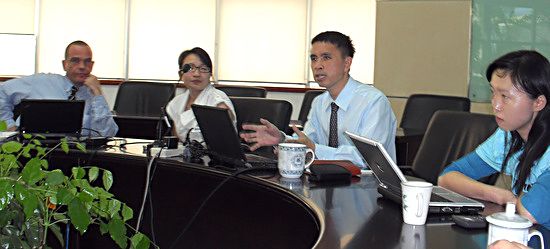
In short, it removes undesirable solutes and particles that have no business coming out the business end of a factory effluence pipe – or wastewater treatment plant.
But the company’s technology is also increasingly used to remove excess sugar from drinks so that they can truly be called “Diet Coke,” excess alcohol from spirits so they can remain at the common threshold of 80 proof (ie: 40% alcohol content) and superfluous active ingredients from pharmaceuticals to ensure that final package labeling is 100% accurate.
Suntar’s relationship with clients does not end when the fanfare of the contract signing is over and the last membrane had been installed, thus giving a very promising “recurring income” facet to its business.
“Around 20% of membrane efficiency is lost within 2-3 years. So users of these products need to either replace or install higher treatment capacity at the outset. In addition, membranes generally have a 5-7 year lifespan,” Mr. Lan said.
Thus, Sinomem has a hard time saying goodbye to existing clients, and hopes to have an even easier time saying hello to new ones.
Recent stories:
SINOMEM: Targeting 40 wastewater deals by 2012 from 12 now
SINOMEM 'remains under-valued and mispriced'



